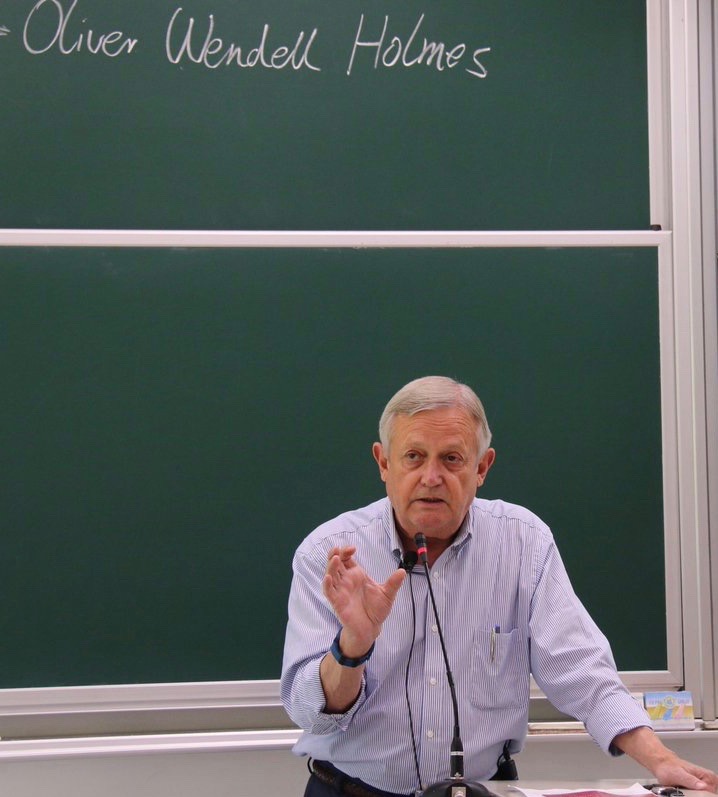David M. O’Brien (1951-2018): Noted political scientist and Supreme Court scholar

on Dec 26, 2018 at 11:53 am

The Supreme Court is defined, in part, by court-watchers – those who chronicle its workings and analyze its jurisprudence. Our understanding of the court depends on scholars such as David M. O’Brien, the late Leone Reaves and George W. Spicer Professor at the University of Virginia’s Department of Politics.
O’Brien, who died from lung cancer on December 20 at the age of 67, was among the most noted Supreme Court scholars of his time.
Born on August 30, 1951, O’Brien grew up in Southern California and received his B.A. and Ph.D. in political science from the University of California at Santa Barbara. He then traveled east to work at the Supreme Court. Between 1982 and 1984, he served first as a Supreme Court fellow and then as a research associate for Chief Justice Warren Burger.
During his long tenure at the University of Virginia, O’Brien was one of the leading political scientists writing about the court. He was a student of the famed political scientist C. Herman Pritchett. “I was fortunate,” he said in 2014 interview for this blog, “to have studied with … Pritchett, whose book The Roosevelt Court (1948) started the so-called ‘behavioral revolution’ in the study of the Supreme Court by focusing on Justices’ voting alignments and disagreement rates. Justice Felix Frankfurter thought that it was nonsense, but the Harvard Law Review soon adopted Pritchett’s methods in its annual review of the Court’s term.” O’Brien’s scholarship was also influenced by other famed political scientists including Henry Abraham (his friend and colleague), Walter F. Murphy and Alpheus Mason.
“Monumentally important book”
After his stint at the court and during his teaching years, O’Brien was much sought after as an expert on the Supreme Court. For example, O’Brien was interviewed on C-SPAN 15 times between 1986 and 2005. As he told Brian Lamb in a September 8, 2005, C-SPAN interview, working at the court “really changed my perspective on the Court as a human institution.” It was that experience that influenced one of O’Brien’s most well-known books, “Storm Center: The Supreme Court in American Politics” (11th ed., 2017).
In his review essay on “Storm Center” in “Constitutional Commentary,” Professor Jeffrey B. Morris commented on O’Brien’s research:
Storm Center is based upon considerable archival research. The papers of Chief Justices Taft, Hughes, Stone, Vinson, and Warren, [and] of Associate Justices Frankfurter[, ]Black, Murphy, Reed, Sutherland, and Van Devanter[,] among others, were culled, as were oral histories given by Justices Clark, Marshall, Jackson, and Douglas. O’Brien also employed the relevant collections in the Hoover, Roosevelt, Truman, Eisenhower, Kennedy, Johnson, and Ford Libraries.
O’Brien’s examination of judicial behavior in “Storm Center” was also buttressed by considerable historical and statistical evidence about the court and its workings. O’Brien even interviewed some of the sitting justices and continued to correspond with a few of them. Justice William Brennan granted O’Brien access to his court papers, as O’Brien told this blog.
Professor Neal Devins, who writes on judicial behavior, described “Storm Center” as “a monumentally important book that helped debunk the myth that the Supreme Court was removed from politics.”
An idea that took hold
It was small but notable: Back in 1997 O’Brien co-authored a Washington Post op-ed that pointed to a problem that needed to be fixed. The op-ed began: “It is an unwritten rule but a rule nonetheless. No ordinary citizen can take notes in the courtroom of the U.S. Supreme Court, unless granted special prior approval by the officer of the Public Information Office.”
Six years later that rule of unnecessary decorum was quietly reversed. At the time, O’Brien chuckled about how long it took: “The Court moves in such measured and mysterious ways,” he said.
Prolific scholar
Beyond his more than 100 scholarly articles, O’Brien published numerous books, including:
- “Constitutional Law and Politics: Civil Rights and Civil Liberties” (2 vols., 10th ed., 2017)
- “Judges on Judging: Views from the Bench” (5th ed., 2016)
- “Congress Shall Make No Law: The First Amendment, Unprotected Expression, and the U.S. Supreme Court” (2010)
- “Courts and Judicial Policymaking” (2006, with Christopher Banks)
- “Animal Sacrifice and Religious Freedom: Church of the Lukumi Babalu Aye v. City of Hialeah” (2004)
- “To Dream of Dreams: Religious Freedom and Constitutional Politics in Postwar Japan” (1996) (with Yasuo Ohkoshi)
- “What Process is Due?: Courts and Science-Policy Disputes” (1988)
- “Judicial Roulette: Report of the Twentieth Century Fund Task Force on Judicial Selection” (1988)
- “The Public’s Right to Know, The Supreme Court and the First Amendment” (1981), and
- “Privacy, Law and Public Policy” (1979) (foreword by C. Herman Pritchett)
His last book was “Justice Robert H. Jackson’s Unpublished Opinion in Brown v. Board: Conflict, Compromise, and Constitutional Interpretation”, which he discussed with me in a 2017 Q&A for this blog.



